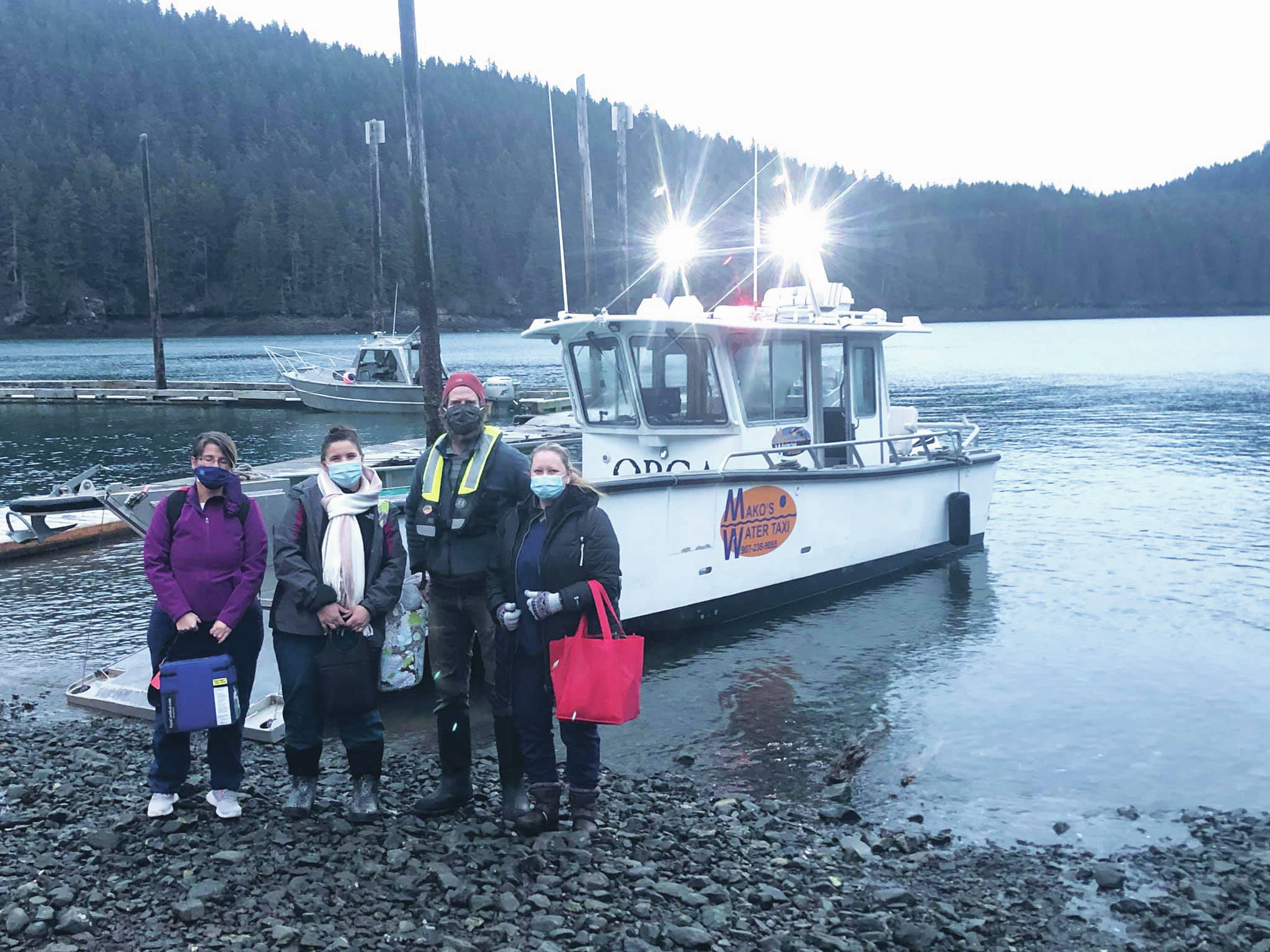HOMER — A boat trip across Kachemak Bay last Thursday evoked the spirit of the 1925 Nome Serum Run. The trip on the M/V Orca with Capt. Curtis Jackson to transport SVT Health & Wellness Center medical workers came with special freight: the first delivery of the Pfizer COVID-19 vaccine to Seldovia.
Five days a week, SVT Health & Wellness Center nurses and nurse practitioners go from Homer to Seldovia, usually by air taxi service Smokey Bay Air, said Laurel Hilts, marketing and public relations director for Seldovia Village Tribe, the Alaska Native tribe that runs health clinics in Homer, Seldovia and Anchor Point.
Bad weather kept Smokey Bay Air from flying on Dec. 17, and so SVT called its backup transportation option, Mako’s Water Taxi. A village of about 430 people, including the city and surrounding area, Seldovia is mostly accessible by air or boat.
“The visibility got pretty poor. They looked at the whole weather window and gave us a call,” said Jackson, owner and operator of the Orca, one of the boats under contract with Mako’s.
Jackson met the team of a nurse, two nurse practitioners and a medical assistant at the Homer Harbor on the Homer Spit. Relief captain Janel Harris came along as crew.
“She (one of the medical team) holds up this blue box,” Jackson said. “‘Is that the vaccine?’ (he asked) I didn’t know until they were at my boat.”
Jackson said conditions were rough, with 3- to 4-foot seas and whitecaps. The Orca took the team from Homer to Jakolof Bay on the south side of Kachemak Bay, where a road connects to Seldovia and a waiting car took the workers and precious cargo on the last leg of the trip.
Hilts said one member of the team, family nurse practitioner Julie Drude, was a traveling health care worker and had never been across the bay before.
“It was a big of a rough ride,” Hilts said. “She said it was an experience, for sure.”
Normally the trip from Homer through Eldred Passage and around Yukon Island takes about 30 minutes, Jackson said, but with rough seas it was twice that.
“I was about half way through this weather and said, ‘This is like our mini Iditarod, and one of the others said, ‘Like Capt. Balto.’ One of the nurses said, ‘Who is that?’” Jackson said.
Balto was the lead dog for musher Gunnar Kaasen, the team that delivered diphtheria serum to Nome in 1925 after a series of dog teams transported the serum almost 675 miles from Nenana to Nome. Nome had a diphtheria outbreak and was under quarantine until serum could be transported there. The serum first had to be delivered by the Alaska Railroad from Anchorage to Nenana and then across the rugged Alaska terrain to Nome.
Legendary musher Leonard Seppala and his lead dog Togo had the longest run of 91 miles. Although the Iditarod Trail Sled Dog Race takes a different route, the Nome Serum Run later inspired the Iditarod.
Jackson said his emotions have been a bit close to the surface during the pandemic. Like many tourist-oriented businesses, water taxis in Homer faced economic losses because of a drop in foreign and Lower 48 travel to Alaska. Jackson said they probably had about 4,000 passengers this summer, down 30% from normal years.
“Every day we were going to work and there were like 40 strangers who were going to be hanging out in the elevator with you,” he said, comparing the close quarters of a boat to being in an elevator.
In fair weather in the summer, passengers rode outside on the Orca, a 32-foot landing craft with a big open deck. Everyone wore masks. Fortunately, there has been only one contact-trace call Mako’s Water Taxi has received related to a COVID-19 patient, Jackson said.
“We’ve been pretty much in the clear,” Jackson said. “I’m surprised, honestly.”
Jackson wrote up a Facebook post about delivering the medical workers and the vaccine, calling it “a little victory.”
“That little blue box was the best Christmas present a tired boat captain could ask for, my friends,” he wrote. “It’s been a long century of a year, Alaska, but today felt like the light of coming dawn and better days ahead.”
“We were getting to be a small part of it,” Jackson said about the vaccine delivery. “… This might be the start of what’s getting to be better and better news. It’s pretty emotional.”
Hilts said last week’s delivery of vaccines to Seldovia went to first responders — part of the initial tier of Alaskans to receive the Pfizer vaccine. Homer also got vaccines last Thursday, with the first vaccines administered that morning at South Peninsula Hospital.
Relief captain Harris was one of the health care workers in Homer to get the vaccine. She also works as an emergency medical technician, Jackson said.
On Monday, Hilts was helping to package and distribute holiday food packages to elders and other Seldovia residents.
“Just like us taking boxes around to everybody, it’s a good reminder we can have joy when it’s tough,” Hilts said of the vaccine delivery.
During the pandemic, Seldovia has had three households whose members tested positive for COVID-19, with the infection confined to those households and no one suffering serious illness, Hilts said.
“Somehow we’ve got this great resilience that’s working,” Hilts said.
Hilts praised Mako’s Water Taxi for its help in transporting not just medical staff and the Pfizer vaccine, but other goods, too.
“They were out delivering pumpkins at Halloween,” she said. “They helped everybody bring their turkeys. … And now the vaccine. We do appreciate their generous services.”
Reach Michael Armstrong at marmstrong@homernews.com.

